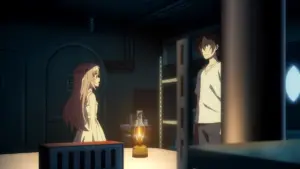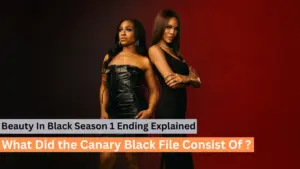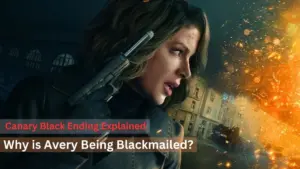Table of Contents
Blink Twice Ending Explained

Zoë Kravitz’s directorial debut, Blink Twice, is a psychological thriller and vengeance film with societal commentary on abuse of power, trauma, and sexual assault. Kravitz began working on the script with co-writer E.T. Fegenbaum under the working title Pussy Island in 2017, just as the #MeToo movement was gaining traction online and powerful men in Hollywood were exposed as abusers.
Kravitz, as director and co-writer, brings a distinct perspective not only as a woman but also as someone born into the entertainment world and raised around powerful individuals. Blink Twice contains plenty of violence, but it is neither exploitative nor sexually gratuitous in the same way that I Spit on Your Grave and The Last House on the Left were. In reality, the violence is therapeutic, and the film concludes with a Good For Her ending that challenges assumptions and stereotypes about how to handle such a sensitive topic.
What Happens in ‘Blink Twice’?
Frida (Naomi Ackie), a nail artist, and Jess (Alia Shawkat), an aspiring actor, get a catering job at a fundraising gala for billionaire Slater King’s (Channing Tatum) software company. Slater is portrayed in the first scene of the film apologising for an unspecified indiscretion, telling the audience that he has sought help for his behaviour through therapy, stepping down from his job as CEO, and isolating himself.
On his island, in a situation that will feel familiar to anyone who remembers the bogus post-MeToo apology tours. Frida and Jess change into similar costumes, one red and one blue, maybe as a tribute to The Matrix, and shmooze with the powerful guests of the gala, inching closer and closer to the attractive and charismatic Slater King, who eventually invites them to accompany him for a trip to his private island.
The two accept his invitation and soon find themselves, along with a small group of other young men and women, spiralling down a rabbit hole of drugs, booze, and hedonistic excess. Slater’s crew includes some known figures, including Haley Joel Osment, Christian Slater, Simon Rex, Geena Davis, and Kyle MacLachlan, all of whom are involved in the abuse of power on the island.
The young woman and one young guy are given a perfume that erases their memories, allowing Slater and the other men to sexually attack and torture them without their knowledge. Jess, who has been making jokes about the cult-like aspect of matching clothes and phone surrendering, is bitten by a snake one night and vanishes the next day.
Frida and fellow guest Sarah (Adria Arjona), a regular contestant on a survival reality show, grow sceptical of what is or is not happening to them and quickly blame themselves for accepting an invitation to accompany guys they do not know on a vacation to a secluded island. Later that day, Frida comes across one of the island’s groundskeepers, who is shown slaughtering snakes around the property and refers to her as “red rabbit,” and takes a gulp from what appears to be a bottle of moonshine but is pure snake venom.
The venom, which also serves as the antidote to the mind-erasing perfume, allows Frida to recall what has happened to her and the other guests, including the murder of Jess, who was slain for regaining her memories as a result of the venom in her system from the snake bite.
Frida and Sarah form a bond and vow to continue pretending to be having fun in a calculated act of self-preservation while secretly dosing the other women, including King’s assistant Stacy (Davis), with snake venom in the hopes that they will soon regain their memories and be able to work together to find a way off the island.
In ‘Blink Twice,’ Revenge is a Dish Best Served Bloody
At dinner, Sarah delivers a speech about how women are frequently pitted against one another as competitors when they should be supporting one another, in what appears to be a tragic revelation occurring in real time. Later, Frida discovers a Polaroid photo of herself with long hair and different nails than the ones she is wearing, ones with red rabbits painted on them.
She puts the pieces together and realises she’s been there before, and this isn’t the first time she’s been sexually molested on this island. There are signs throughout the film, including her talk with Slater about memory repression (“forgetting is a gift”), the red lipstick she discovers in her drawer, the scar on her left eye, and Vic’s missing pinky finger. This discovery exacerbates Frida’s wrath and inspires her to exact revenge on Slater.
One by one, the women begin to recall what happened to them while on the island, and chaos ensues. They assault their abusers in a bloody vengeance and violent catharsis scene in which the males are mercilessly slaughtered and mutilated by the women they exploit.
The viewer cannot help but cheer them on in their final acts of vengeance and recapture autonomy, even if they are all slaughtered in the process, sealing their victim status for good. Stacy, who admits she doesn’t want to recall what occurred on the island, attacks Frida in her room.
After killing Stacy, Frida and Sarah flee and kill the remaining men, while Slater hides in his suite and murders Camilla (Liz Caribel) by placing his foot on her throat as she lies tied up on the floor, suffocating her to death in a powerful allegory of the patriarchal boot on a woman’s neck. Frida and Sarah make their way to Slater’s apartment as Beyoncé’s “I’m That Girl” begins, determined to take him down once and for all.
Frida Takes Justice Into Her Own Hands
The film’s ending is a physical incarnation of the saying “if you can’t join them, beat them,” and it is comparable to the ends of films such as Knives Out, The Menu, and Poor Things, which have become known as Good For Her films. While the Me Too campaign began strong and resulted in the removal of some powerful men who were abusing their position in Hollywood and beyond
The reality is that many other men who were outed during this time just lay low, apologised, and resumed their jobs, with little to no justice administered to their victims. Slater even admits it in the film: “I’m sorry” can only be said so many times before it loses its meaning. The ending of Blink Twice delves into this unpleasant fact and turns it on its head.
After discovering the truth about the island and fighting her way off, Frida decides to take justice into her own hands rather than tell the police or the media what happened to her, especially since all evidence has been burned by fire. In the closing moments of her and Sarah’s showdown with Slater, she replaces his vape liquid with perfume, wiping away his recollection.
In the closing scene, it is revealed that Frida is now married to Slater, has taken on a new life as the rich CEO of Slater’s company, King Tech, and is well aware of what he and the other men have been doing to young women for who knows how long. Rich (MacLachlan), Slater’s “therapist,” is surprised to discover that she remembers not just who he is, but also everything that occurred to her on the island. Power has moved in her favour. There is no forgiveness, and forgetting is a blessing.
The ending of Blink Twice is unexpected, to say the least, and challenges preconceptions about how these types of situations typically finish, particularly when it comes to women’s lived experiences in a patriarchal culture.
Women are frequently disbelieved, silenced, told they are misremembering or fabricating events, or shamed into remaining silent in instances involving sexual abuse and the inherent power disparities that exist despite all of the progress made in the last decade. Kravitz’s directorial debut is a unique twist on the revenge film, and it has become a permanent fixture in the Good For Her canon.












